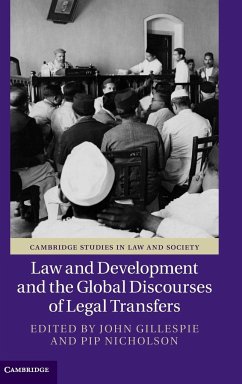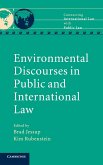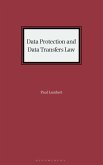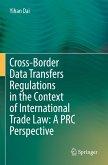Law and Development and the Global Discourses of Legal Transfers
Herausgeber: Gillespie, John; Nicholson, Pip
Law and Development and the Global Discourses of Legal Transfers
Herausgeber: Gillespie, John; Nicholson, Pip
- Gebundenes Buch
- Merkliste
- Auf die Merkliste
- Bewerten Bewerten
- Teilen
- Produkt teilen
- Produkterinnerung
- Produkterinnerung
Leading scholars provide a fresh theoretical look at the reasons why many legal development projects fail.
Andere Kunden interessierten sich auch für
![Environmental Discourses in Public and International Law Environmental Discourses in Public and International Law]() Environmental Discourses in Public and International Law174,99 €
Environmental Discourses in Public and International Law174,99 €![The Law of Tupe Transfers 3e The Law of Tupe Transfers 3e]() Charles Wynn-EvansThe Law of Tupe Transfers 3e251,99 €
Charles Wynn-EvansThe Law of Tupe Transfers 3e251,99 €![Data Protection and Data Transfers Law Data Protection and Data Transfers Law]() Paul LambertData Protection and Data Transfers Law229,99 €
Paul LambertData Protection and Data Transfers Law229,99 €![Cross-Border Data Transfers Regulations in the Context of International Trade Law: A PRC Perspective Cross-Border Data Transfers Regulations in the Context of International Trade Law: A PRC Perspective]() Yihan DaiCross-Border Data Transfers Regulations in the Context of International Trade Law: A PRC Perspective97,99 €
Yihan DaiCross-Border Data Transfers Regulations in the Context of International Trade Law: A PRC Perspective97,99 €![The Works of James Wilson, Associate Justice of the Supreme Court of the United States ...: Being His Public Discourses Upon Jurisprudence and the Pol The Works of James Wilson, Associate Justice of the Supreme Court of the United States ...: Being His Public Discourses Upon Jurisprudence and the Pol]() James WilsonThe Works of James Wilson, Associate Justice of the Supreme Court of the United States ...: Being His Public Discourses Upon Jurisprudence and the Pol45,99 €
James WilsonThe Works of James Wilson, Associate Justice of the Supreme Court of the United States ...: Being His Public Discourses Upon Jurisprudence and the Pol45,99 €![Short Discourses for all the Sundays in the Year, According to the Mind & Method Of the Catechism Of Short Discourses for all the Sundays in the Year, According to the Mind & Method Of the Catechism Of]() John McQuirkShort Discourses for all the Sundays in the Year, According to the Mind & Method Of the Catechism Of40,99 €
John McQuirkShort Discourses for all the Sundays in the Year, According to the Mind & Method Of the Catechism Of40,99 €![Practical Discourses Upon the Lord's Prayer Practical Discourses Upon the Lord's Prayer]() Thomas MangeyPractical Discourses Upon the Lord's Prayer37,99 €
Thomas MangeyPractical Discourses Upon the Lord's Prayer37,99 €-
-
-
Leading scholars provide a fresh theoretical look at the reasons why many legal development projects fail.
Hinweis: Dieser Artikel kann nur an eine deutsche Lieferadresse ausgeliefert werden.
Hinweis: Dieser Artikel kann nur an eine deutsche Lieferadresse ausgeliefert werden.
Produktdetails
- Produktdetails
- Verlag: Cambridge University Press
- Seitenzahl: 402
- Erscheinungstermin: 28. Juni 2012
- Englisch
- Abmessung: 235mm x 157mm x 26mm
- Gewicht: 731g
- ISBN-13: 9781107018938
- ISBN-10: 1107018935
- Artikelnr.: 34570596
- Herstellerkennzeichnung
- Libri GmbH
- Europaallee 1
- 36244 Bad Hersfeld
- gpsr@libri.de
- Verlag: Cambridge University Press
- Seitenzahl: 402
- Erscheinungstermin: 28. Juni 2012
- Englisch
- Abmessung: 235mm x 157mm x 26mm
- Gewicht: 731g
- ISBN-13: 9781107018938
- ISBN-10: 1107018935
- Artikelnr.: 34570596
- Herstellerkennzeichnung
- Libri GmbH
- Europaallee 1
- 36244 Bad Hersfeld
- gpsr@libri.de
1. Interpreting legal transfers: the implications for law and development
John Gillespie and Pip Nicholson; Part I. Theorising Legal Transfers
Towards an Interpretative Analysis: 2. Relocating global legal scripts in
local networks of meaning John Gillespie; 3. International and domestic
selective adaptation: the case of Charter 08 Pitman Potter; 4. Rights and
regulation as a framework for exploring reverse legal transfers: hegemony
and counter-hegemony in the Bolivian water sector Bronwen Morgan; Part II.
Re-interpreting Universalised Standards of Practice: TRIPS and Human Rights
Norms: 5. The transfer of pharmaceutical patent laws: the case of India's
Paragraph 3(d) Christopher Arup; 6. Between rhetoric and reality: the use
of international human rights norms in law reform debates in China Sarah
Biddulph; Part III. Re-interpreting the Rule of Law as Transfer: 7. Between
global norms and domestic realities: judicial reforms in China Randall
Peerenboom; 8. Official discourses and court-oriented legal reform in
Vietnam Pip Nicholson and Simon Pitt; 9. Constructing law from development:
cause lawyers, generational narratives, and the rule of law in Thailand
Frank Munger; Part IV. Re-interpreting Global Family and Religious Norms:
10. Family law transfers from Europe to Africa: lessons for the methodology
of comparative legal research Mark Van Hoecke; 11. Resistible force meets
malleable object: the story of the 'introduction' of norms of gender
equality into Japanese employment practice Frank Upham; 12. Discordant
voices on the status of Islam under the Malaysian constitution Elsa
Satkunasingam; 13. Unpacking a global norm in a local context: an
historical overview of the epistemic communities that are shaping Zakat
practice in Malaysia Kerstin Steiner.
John Gillespie and Pip Nicholson; Part I. Theorising Legal Transfers
Towards an Interpretative Analysis: 2. Relocating global legal scripts in
local networks of meaning John Gillespie; 3. International and domestic
selective adaptation: the case of Charter 08 Pitman Potter; 4. Rights and
regulation as a framework for exploring reverse legal transfers: hegemony
and counter-hegemony in the Bolivian water sector Bronwen Morgan; Part II.
Re-interpreting Universalised Standards of Practice: TRIPS and Human Rights
Norms: 5. The transfer of pharmaceutical patent laws: the case of India's
Paragraph 3(d) Christopher Arup; 6. Between rhetoric and reality: the use
of international human rights norms in law reform debates in China Sarah
Biddulph; Part III. Re-interpreting the Rule of Law as Transfer: 7. Between
global norms and domestic realities: judicial reforms in China Randall
Peerenboom; 8. Official discourses and court-oriented legal reform in
Vietnam Pip Nicholson and Simon Pitt; 9. Constructing law from development:
cause lawyers, generational narratives, and the rule of law in Thailand
Frank Munger; Part IV. Re-interpreting Global Family and Religious Norms:
10. Family law transfers from Europe to Africa: lessons for the methodology
of comparative legal research Mark Van Hoecke; 11. Resistible force meets
malleable object: the story of the 'introduction' of norms of gender
equality into Japanese employment practice Frank Upham; 12. Discordant
voices on the status of Islam under the Malaysian constitution Elsa
Satkunasingam; 13. Unpacking a global norm in a local context: an
historical overview of the epistemic communities that are shaping Zakat
practice in Malaysia Kerstin Steiner.
1. Interpreting legal transfers: the implications for law and development
John Gillespie and Pip Nicholson; Part I. Theorising Legal Transfers
Towards an Interpretative Analysis: 2. Relocating global legal scripts in
local networks of meaning John Gillespie; 3. International and domestic
selective adaptation: the case of Charter 08 Pitman Potter; 4. Rights and
regulation as a framework for exploring reverse legal transfers: hegemony
and counter-hegemony in the Bolivian water sector Bronwen Morgan; Part II.
Re-interpreting Universalised Standards of Practice: TRIPS and Human Rights
Norms: 5. The transfer of pharmaceutical patent laws: the case of India's
Paragraph 3(d) Christopher Arup; 6. Between rhetoric and reality: the use
of international human rights norms in law reform debates in China Sarah
Biddulph; Part III. Re-interpreting the Rule of Law as Transfer: 7. Between
global norms and domestic realities: judicial reforms in China Randall
Peerenboom; 8. Official discourses and court-oriented legal reform in
Vietnam Pip Nicholson and Simon Pitt; 9. Constructing law from development:
cause lawyers, generational narratives, and the rule of law in Thailand
Frank Munger; Part IV. Re-interpreting Global Family and Religious Norms:
10. Family law transfers from Europe to Africa: lessons for the methodology
of comparative legal research Mark Van Hoecke; 11. Resistible force meets
malleable object: the story of the 'introduction' of norms of gender
equality into Japanese employment practice Frank Upham; 12. Discordant
voices on the status of Islam under the Malaysian constitution Elsa
Satkunasingam; 13. Unpacking a global norm in a local context: an
historical overview of the epistemic communities that are shaping Zakat
practice in Malaysia Kerstin Steiner.
John Gillespie and Pip Nicholson; Part I. Theorising Legal Transfers
Towards an Interpretative Analysis: 2. Relocating global legal scripts in
local networks of meaning John Gillespie; 3. International and domestic
selective adaptation: the case of Charter 08 Pitman Potter; 4. Rights and
regulation as a framework for exploring reverse legal transfers: hegemony
and counter-hegemony in the Bolivian water sector Bronwen Morgan; Part II.
Re-interpreting Universalised Standards of Practice: TRIPS and Human Rights
Norms: 5. The transfer of pharmaceutical patent laws: the case of India's
Paragraph 3(d) Christopher Arup; 6. Between rhetoric and reality: the use
of international human rights norms in law reform debates in China Sarah
Biddulph; Part III. Re-interpreting the Rule of Law as Transfer: 7. Between
global norms and domestic realities: judicial reforms in China Randall
Peerenboom; 8. Official discourses and court-oriented legal reform in
Vietnam Pip Nicholson and Simon Pitt; 9. Constructing law from development:
cause lawyers, generational narratives, and the rule of law in Thailand
Frank Munger; Part IV. Re-interpreting Global Family and Religious Norms:
10. Family law transfers from Europe to Africa: lessons for the methodology
of comparative legal research Mark Van Hoecke; 11. Resistible force meets
malleable object: the story of the 'introduction' of norms of gender
equality into Japanese employment practice Frank Upham; 12. Discordant
voices on the status of Islam under the Malaysian constitution Elsa
Satkunasingam; 13. Unpacking a global norm in a local context: an
historical overview of the epistemic communities that are shaping Zakat
practice in Malaysia Kerstin Steiner.








